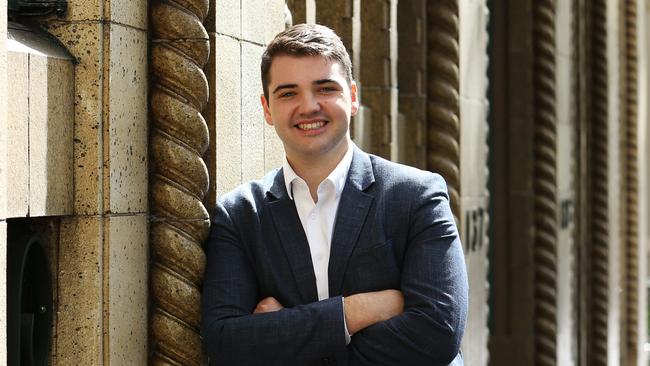Engage with Young Liberals, leaders urged
Young Liberals federal President Dmitri Chugg-Palmer has called on the party’s elders to help address tanking popularity among Millennials and Gen Z.

Young Liberals federal president Dmitry Chugg-Palmer has called on the party’s leaders and MPs to collaborate more closely with the movement on policy to help address tanking popularity among millennials and Gen Z.
As the Liberal Party faces a continent washed red, Mr Chugg-Palmer said while certain senior members were better at picking up the phone to the party’s youth wing, overall the party needed to start engaging the voices within the party to help understand the disconnect with younger voters.
“I’d encourage the parliamentary party to make it a priority for them to actively seek out the views of Young Liberals by bringing them into policy development processes,” he told The Australian.
“It would be a smart idea on their behalf to go and actually talk to people that are representative of a cohort of voters that we are struggling with at the moment.”
His views were echoed during interviews with several former Young Liberal members and presidents across the country, done on the condition of anonymity due to party rules preventing members from speaking to the media about internal matters.
Those conversations revealed Young Liberals were disillusioned with the seemingly non-existent mechanisms for the youth movement to have its voice heard on issues of substantive policy, with one saying the movement’s deliberations were tantamount to “policy masturbation”.
“It gets passed by the executive council then chucked in the bin,” one former president said. “Millennials are now the largest demographic group in Australia, but it seems the older people are still calling the shots. There seems to be little ability for the Young Liberals to voice their concerns.”
One issue on which Mr Chugg-Palmer would like to see the federal party better reflect is the constitutionally enshrined voice to parliament, saying he wanted it to engage with the parliamentary committee process to ensure it was “the most robust model possible”.
“The voice is obviously an issue that young Australians are overwhelmingly in favour of,” he said.
“So my encouragement would be to engage in the process like some of the Liberals that have actively spoken out in favour of the voice, like Julian Leeser and Andrew Bragg.”
Some Young Liberals argued that while there was a broad spectrum of views within the organisation, they felt they were dismissed by the senior party because they were perceived as too progressive, despite the changing political winds pushing the centre away from conservatives.
“The party does nothing to support the Young Liberals, in fact they detest them because they think they are communists,” one source said.
“The YLs are reflecting views that are relevant and prevalent in the millennial generation. It’s not about reflecting just what is popular but the values the leaders talk about are relating to a new generation,” a Queensland member said.
In December, the Australian Election Study found only one in four voters under the age of 40 reported voting for the Coalition at the federal election – the lowest recorded level in the study’s 35-year history.
The party’s failures to engage with young people aren’t just evident internally, one Young Liberal member says. She recalls not seeing any advertising from the party – either online or on television – during the recent NSW election, which showed either a failure or lack of desire to engage young women.
“The party has vacated the young person’s space. There’s an assumption young people will come around and vote Liberal but it ignores the broader brand damage being done,” she said.
The cry for greater representation on policy issues comes amid a recent push by senior members within the Queensland and NSW divisions to professionalise the outfits, trying to help shed the archetype of a “wealthy white male wearing chinos and RM Williams” and move towards a more diverse mixture of members.



To join the conversation, please log in. Don't have an account? Register
Join the conversation, you are commenting as Logout